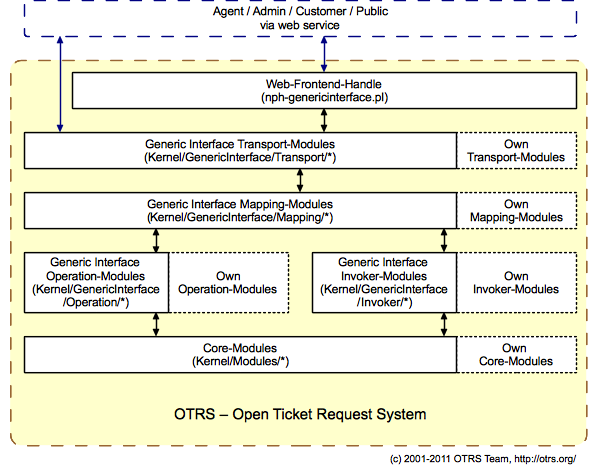Architecture Overview¶
The OTOBO framework is modular. The following picture shows the basic layer architecture of OTOBO.

OTOBO Architecture
The OTOBO Generic Interface continues OTOBO modularity. The next picture shows the basic layer architecture of the Generic Interface.

Generic Interface Architecture
Directories¶
| Directory | Description |
|---|---|
| bin/ | command line tools |
| bin/cgi-bin/ | web handle |
| bin/fcgi-bin/ | fast CGI web handle |
| Kernel | application code base |
| Kernel/Config/ | configuration files |
| Kernel/Config/Files | configuration files |
| Kernel/GenericInterface/ | the Generic Interface API |
| Kernel/GenericInterface/Invoker/ | invoker modules for Generic Interface |
| Kernel/GenericInterface/Mapping/ | mapping modules for Generic Interface, e.g. Simple |
| Kernel/GenericInterface/Operation / | operation modules for Generic Interface |
| Kernel/GenericInterface/Transport / | transport modules for Generic Interface, e.g. „HTTP SOAP“ |
| Kernel/Language | language translation files |
| Kernel/Scheduler/ | Scheduler files |
| Kernel/Scheduler/TaskHandler | handler modules for scheduler tasks, e.g. GenericInterface |
| Kernel/System/ | core modules, e.g. Log, Ticket |
| Kernel/Modules/ | front end modules, e.g. QueueView |
| Kernel/Output/HTML/ | html templates |
| var/ | variable data |
| var/log | logfiles |
| var/cron/ | cron files |
| var/httpd/htdocs/ | htdocs directory with index.html |
| var/httpd/htdocs/skins/Agent/ | available skins for the Agent interface |
| var/httpd/htdocs/skins/Customer/ | available skins for the Customer interface |
| var/httpd/htdocs/js/ | JavaScript files |
| scripts/ | misc files |
| scripts/test/ | unit test files |
| scripts/test/sample/ | unit test sample data files |
Files¶
- .pl = Perl
- .pm = Perl Module
- .tt = Template::Toolkit template files
- .dist = Default templates of files
- .yaml or .yml = YAML files, used for Web Service configuration
Core Modules¶
Core modules are located under $OTOBO_HOME/Kernel/System/*. This layer is for the logical work. Core modules are used to handle system routines like lock ticket and create ticket. A few main core modules
are:
Kernel::System::Configto access configuration options.Kernel::System::Logto log into OTOBO log back end.Kernel::System::DBto access the database back end.Kernel::System::Authto check user authentication.Kernel::System::Userto manage users.Kernel::System::Groupto manage groups.Kernel::System::Emailfor sending emails.
For more information see the Documentation Portal.
Front End Handle¶
The interface between the browser, web server and the front end modules. A front end module can be used via the HTTP link.
http://localhost/otobo/index.pl?Action=Module
Front End Modules¶
Front end modules are located under $OTOBO_HOME/Kernel/Modules/*.pm. There are two public functions in there - new() and run() - which are accessed from the front end handle (e.g. index.pl).
new() is used to create a front end module object. The front end handle provides the used front end module with the basic framework objects. These are, for example:
ParamObjectto get web form params.DBObjectto use existing database connections.LayoutObjectto use templates and other HTML layout functions.ConfigObjectto access config settings.LogObjectto use the framework log system.UserObjectto get the user functions from the current user.GroupObjectto get the group functions.
For more information see the Documentation Portal.
CMD Front End¶
The CMD (command line) front end is like the web front end handle and the web front end module in one (just without the LayoutObject) and uses the core modules for some actions in the system.
Generic Interface Modules¶
Generic interface modules are located under $OTOBO_HOME/Kernel/GenericInterface/*. Generic interface modules are used to handle each part of a web service execution on the system. The main modules for the generic interface are:
Kernel::GenericInterface::Transportto interact with remote systems.Kernel::GenericInterface::Mappingto transform data into a required format.Kernel::GenericInterface::Requesterto use OTOBO as a client for the web service.Kernel::GenericInterface::Providerto use OTOBO as a server for web service.Kernel::GenericInterface::Operationto execute provider actions.Kernel::GenericInterface::Invokerto execute requester actions.Kernel::GenericInterface::Debuggerto track web service communication, using log entries.
For more information see the Documentation Portal.
Generic Interface Invoker Modules¶
Generic interface invoker modules are located under $OTOBO_HOME/Kernel/GenericInterface/Invoker/*. Each invoker is contained in a folder called Controller. This approach helps to define a name space not only for internal classes and methods but for filenames too. For example: $OTOBO_HOME/Kernel/GenericInterface/Invoker/Test/ is the controller for all test type invokers.
Generic interface invoker modules are used as a back end to create requests for remote systems to execute actions.
For more information see the Documentation Portal.
Generic Interface Mapping Modules¶
Generic interface mapping modules are located under $OTOBO_HOME/Kernel/GenericInterface/Mapping/*. These modules are used to transform data (keys and values) from one format to another.
For more information see the Documentation Portal.
Generic Interface Operation Modules¶
Generic interface operation modules are located under $OTOBO_HOME/Kernel/GenericInterface/Operation/*. Each operation is contained in a folder called Controller. This approach help to define a name space not only for internal classes and methods but for filenames too. For example: $OTOBO_HOME/Kernel/GenericInterface/Operation/Ticket/ is the controller for all ticket type operations.
Generic interface operation modules are used as a back end to perform actions requested by a remote system.
For more information see the Documentation Portal.
Generic Interface Transport Modules¶
Generic interface network transport modules are located under $OTOBO_HOME/Kernel/GenericInterface/Transport/*. Each transport module should be placed in a directory named as the network protocol used. For example: The HTTP SOAP transport module, located in $OTOBO_HOME/Kernel/GenericInterface/Transport/HTTP/SOAP.pm.
Generic interface transport modules are used send data to, and receive data from a remote system.
For more information see the Documentation Portal.
Scheduler Task Handler Modules¶
Scheduler task handler modules are located under $OTOBO_HOME/Kernel/Scheduler/TaskHandler/*. These modules are used to perform asynchronous tasks. For example, the GenericInterface task handler perform generic interface requests to remote systems outside the Apache process. This helps the system to be more responsive, preventing possible performance issues.
For more information see the Documentation Portal.